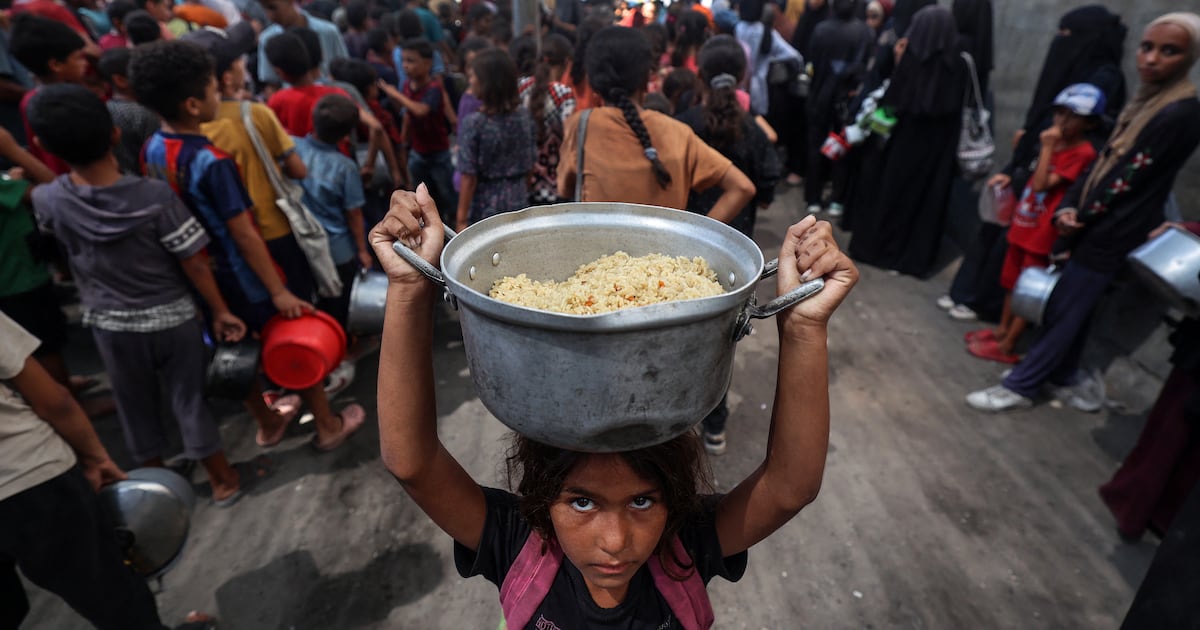World
Global Hunger Crisis Deepens as Conflicts and Aid Cuts Rise

The latest findings from the **2025 Global Hunger Index (GHI)** reveal a troubling trend: the surge in world hunger is primarily driven by ongoing conflicts and significant reductions in humanitarian aid. According to the report, nearly **140 million people** have been affected by **20 food crises** linked to armed violence in the past year. Notably, conflicts in **Gaza** and **Sudan** exemplify the devastating impact of warfare on both livelihoods and access to essential resources.
The report indicates that global famine-level food insecurity has more than doubled between **2023** and **2024**, raising alarms about the potential long-term consequences for food security worldwide. The authors emphasize that the “massive destruction” from these conflicts poses enduring threats, as humanitarian assistance has sharply declined. In contrast, military spending has increased, creating a stark inversion of priorities that undermines global efforts to combat hunger.
As funding for humanitarian aid diminishes, the report warns that assistance is becoming increasingly limited to only the most urgent cases, leaving many vulnerable populations without support. The GHI is produced by **Concern Worldwide**, the German aid agency **Welthungerhilfe**, and the **Institute for International Law of Peace and Armed Conflict**.
Challenges to Achieving Global Hunger Goals
The report outlines the diminishing prospects of attaining the United Nations’ **Sustainable Development Goal (SDG)** of zero hunger by **2030**. If the current pace of progress continues, it could take more than **100 years** to achieve low hunger levels globally. **Réiseal Ní Chéilleachair**, the Director of Strategy, Advocacy, and Learning at Concern Worldwide, stated that “at least **56 countries** will not reach low hunger—let alone zero hunger—by 2030.”
If trends observed since **2016** persist, the global community may not see low hunger levels until **2137**. The report attributes the lack of progress to a combination of escalating conflicts, climate shocks, economic instability, and political disengagement. Despite this grim outlook, Ní Chéilleachair asserts that hunger is not an inevitable outcome but rather a failure of sustained political will and effective policy implementation.
Significant improvements in hunger levels have been documented in certain countries, particularly in **South** and **Southeast Asia** and **Latin America**. The report highlights that sustained investments can lead to meaningful progress in reducing hunger, citing examples from countries such as **Angola**, **Bangladesh**, **Ethiopia**, **India**, **Nepal**, and **Sierra Leone**.
Data Gaps and Rising Hunger Rates
The GHI indicates that hunger is classified as “alarming” in seven countries: **Burundi**, **Democratic Republic of the Congo**, **Haiti**, **Madagascar**, **Somalia**, **South Sudan**, and **Yemen**. In addition, hunger is deemed “serious” in **35 countries**, with many experiencing setbacks. Since **2016**, hunger has increased in **27 countries** with low, moderate, serious, or alarming scores.
The report also highlights significant data gaps, particularly in regions such as the **occupied Palestinian territories**, **Sudan**, and **North Korea**. These gaps obscure the true extent of hunger, suggesting that conditions may be more dire than current figures indicate. With systems designed to monitor and respond to hunger being dismantled or weakened, the report warns of a “dangerous loop” where humanitarian needs become invisible, leading to insufficient assistance.
The report further underscores that many decision-makers are either ignoring or underfunding previously made commitments, instead of taking corrective actions. Vital monitoring and early-warning systems that track hunger are being compromised due to security risks, bureaucratic challenges, and funding cuts, which hinder both aid delivery and data collection.
In conclusion, the **2025 Global Hunger Index** serves as a stark reminder of the urgent need for renewed commitment and action from the international community to address the escalating hunger crisis worldwide. As the report emphasizes, without a concerted effort to prioritize the most affected communities, the path toward achieving global hunger reduction goals will continue to narrow.
-

 Top Stories3 months ago
Top Stories3 months agoTributes Surge for 9-Year-Old Leon Briody After Cancer Battle
-

 Entertainment4 months ago
Entertainment4 months agoAimee Osbourne Joins Family for Emotional Tribute to Ozzy
-

 Politics4 months ago
Politics4 months agoDanny Healy-Rae Considers Complaint After Altercation with Garda
-

 Top Stories4 months ago
Top Stories4 months agoIreland Enjoys Summer Heat as Hurricane Erin Approaches Atlantic
-

 World5 months ago
World5 months agoHawaii Commemorates 80 Years Since Hiroshima Bombing with Ceremony
-

 Top Stories3 months ago
Top Stories3 months agoNewcastle West Woman Patricia Foley Found Safe After Urgent Search
-

 Top Stories5 months ago
Top Stories5 months agoFianna Fáil TDs Urgently Consider Maire Geoghegan-Quinn for Presidency
-

 World5 months ago
World5 months agoCouple Convicted of Murdering Two-Year-Old Grandson in Wales
-

 World5 months ago
World5 months agoGaza Aid Distribution Tragedy: 20 Killed Amid Ongoing Violence
-

 World5 months ago
World5 months agoAristocrat Constance Marten and Partner Convicted of Infant Murder
-

 Top Stories4 months ago
Top Stories4 months agoClimbing Errigal: A Must-Do Summer Adventure in Donegal
-

 Top Stories4 months ago
Top Stories4 months agoHike Donegal’s Errigal Mountain NOW for Unforgettable Summer Views









